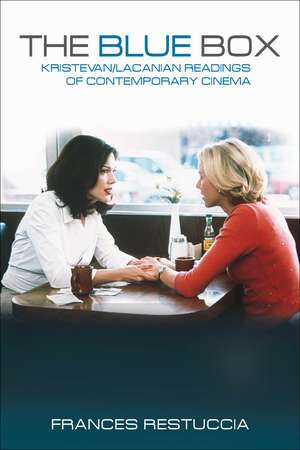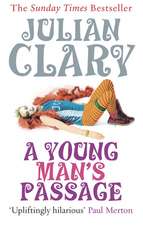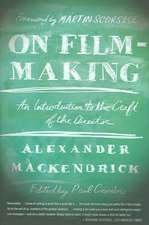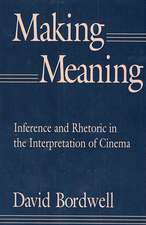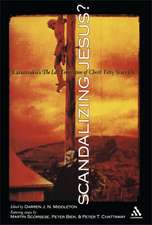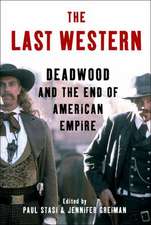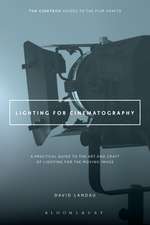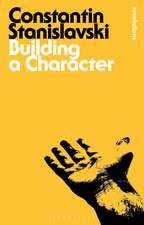The Blue Box: Kristevan/Lacanian Readings of Contemporary Cinema
Autor Frances Restucciaen Limba Engleză Paperback – 2 mai 2012
Preț: 237.28 lei
Preț vechi: 304.92 lei
-22% Nou
Puncte Express: 356
Preț estimativ în valută:
45.40€ • 47.53$ • 37.57£
45.40€ • 47.53$ • 37.57£
Carte tipărită la comandă
Livrare economică 05-19 aprilie
Preluare comenzi: 021 569.72.76
Specificații
ISBN-13: 9781441107572
ISBN-10: 1441107576
Pagini: 192
Ilustrații: 5 illus
Dimensiuni: 150 x 226 x 13 mm
Greutate: 0.34 kg
Ediția:New.
Editura: Bloomsbury Publishing
Colecția Continuum
Locul publicării:New York, United States
ISBN-10: 1441107576
Pagini: 192
Ilustrații: 5 illus
Dimensiuni: 150 x 226 x 13 mm
Greutate: 0.34 kg
Ediția:New.
Editura: Bloomsbury Publishing
Colecția Continuum
Locul publicării:New York, United States
Caracteristici
Explains the crucial importance of such an intimate psychoanalytic encounter, between spectator and film.
Notă biografică
Frances L. Restuccia is an English Professor at Boston College, where she teaches contemporary literary and cultural theory, the modern novel, the world novel, and film/film theory. She is the author of Amorous Acts: Lacanian Ethics in Modernism, Film, and Queer Theory (Stanford UP).
Cuprins
Introduction: Film in Intimate Revolt
I. Black and Blue: Kieslowski's Melancholia
II. Hysterical Love Films: Breaking the Waves, Seventh Heaven, Damage
III. The Use of Perversion: Secretary or The Piano Teacher?
IV. Kristeva's Thought Specular: Countering Fetishism in the Society of the Spectacle
V. Psycho: The Ultimate Seduction
VI. Intimate Volver
VII. The Virtue of Blushing: Turning Anxiety into Shame in Haneke's Caché
I. Black and Blue: Kieslowski's Melancholia
II. Hysterical Love Films: Breaking the Waves, Seventh Heaven, Damage
III. The Use of Perversion: Secretary or The Piano Teacher?
IV. Kristeva's Thought Specular: Countering Fetishism in the Society of the Spectacle
V. Psycho: The Ultimate Seduction
VI. Intimate Volver
VII. The Virtue of Blushing: Turning Anxiety into Shame in Haneke's Caché
Recenzii
The reimagining of psychoanalytic film theory that began with Slavoj Zizek and Joan Copjec has now come to fruition with Frances Restuccia's The Blue Box. After reading Restuccia's book, no one can sustain any doubts that contemporary cinema demands a psychoanalytic approach, and Restuccia provides a completely revolutionary way of conceiving it. While reading The Blue Box, it is as if one sees the films that Restuccia discusses as ports of entry into an understanding of the psyche and society today. From Haneke to Lynch, the book tackles the key works of the most important living directors, and it sheds light on the most obscure regions of their films. Psychoanalytic film theory is born again with The Blue Box. --Todd McGowan, Associate Professor at the University of Vermont, and author of The Real Gaze: Film Theory After Lacan and The Impossible David Lynch
In The Blue Box, Frances Restuccia explores a fascinating selection of 'thought-specular' films through a finely tuned reading of Lacanian and Kristevan theory. With delicate precision and clarity, her analysis pursues the crossing points of deeply disturbing fantasies and conceptual rigor in order to bring forth the potential for transformation, both intimate and communal, as the viable answer to the new maladies of our civilization. --Miglena Nikolchina, Chair of the Department of Theory of Literature, Sofia University, Bulgaria.
This is a tour de force reading of a singularly unsettling series of contemporary films, but with an eye to the redemptive, even mystical, dimension of the extreme states they depict, ones entirely at odds with the society of the spectacle. Using Kristeva's countermodel of the 'thought specular'--and engaging extensively with Lacan, Deleuze, Zizek, Agamben, and psychoanalytic and feminist film theory-Restuccia hails this cinema as providing a key to the 'blue box' of contemporary psychic maladies, in its embrace of nothingness, shame, forgiveness, and love. --Eleanor Kaufman is professor of Comparative Literature, English, and French and Francophone Studies at the University of California, Los Angeles, USA
In The Blue Box, Frances Restuccia explores a fascinating selection of 'thought-specular' films through a finely tuned reading of Lacanian and Kristevan theory. With delicate precision and clarity, her analysis pursues the crossing points of deeply disturbing fantasies and conceptual rigor in order to bring forth the potential for transformation, both intimate and communal, as the viable answer to the new maladies of our civilization. --Miglena Nikolchina, Chair of the Department of Theory of Literature, Sofia University, Bulgaria.
This is a tour de force reading of a singularly unsettling series of contemporary films, but with an eye to the redemptive, even mystical, dimension of the extreme states they depict, ones entirely at odds with the society of the spectacle. Using Kristeva's countermodel of the 'thought specular'--and engaging extensively with Lacan, Deleuze, Zizek, Agamben, and psychoanalytic and feminist film theory-Restuccia hails this cinema as providing a key to the 'blue box' of contemporary psychic maladies, in its embrace of nothingness, shame, forgiveness, and love. --Eleanor Kaufman is professor of Comparative Literature, English, and French and Francophone Studies at the University of California, Los Angeles, USA
